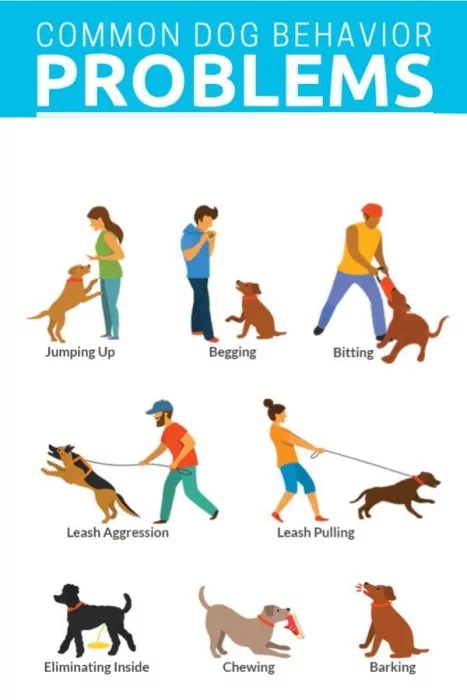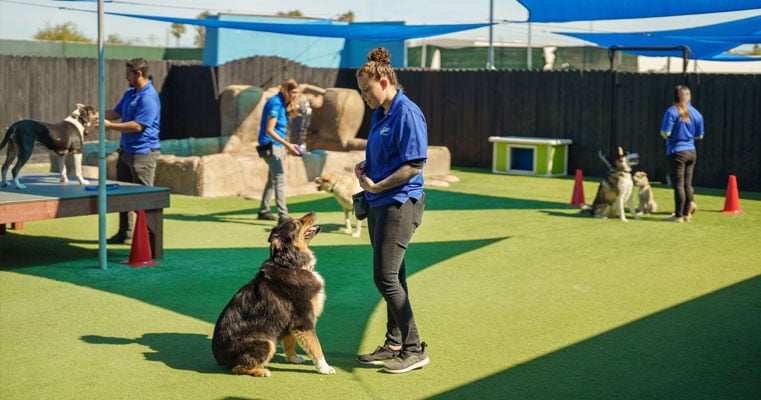Discover Top Tips for Dog Training Charlotte NC That Actually Job
Discover Top Tips for Dog Training Charlotte NC That Actually Job
Blog Article
Unlock Your Pet's Possible: Proven Dog Training Techniques for Success
Reliable pet dog training is a nuanced process that rests on recognizing canine actions and employing scientifically backed techniques. dog training charlotte. By incorporating favorable support, establishing clear commands, and prioritizing socialization, pet owners can grow a productive partnership with their animals. However, obstacles usually develop that call for tailored options and a person strategy. Checking out these shown techniques reveals not only the capacity for behavioral improvement yet additionally the deeper bond that can be formed in between proprietor and pet dog. What necessary methods must be thought about to genuinely unlock your pet dog's possibility?
Recognizing Canine Actions
Comprehending dog actions is necessary for reliable training and cultivating a positive partnership between pets and their owners. A comprehensive understanding of canine body language, articulations, and social interactions is crucial for acknowledging their needs and feelings. Dogs interact largely with non-verbal signs; for example, a wagging tail might suggest exhilaration, while pinned ears can signal concern or submission.

Furthermore, environmental aspects play a considerable function in forming a pet dog's habits. Modifications in routine, new surroundings, or the presence of unfamiliar individuals can lead to stress or anxiety in pets. Identifying these triggers makes it possible for owners to alleviate adverse responses and create ideal training approaches.
Inevitably, a deep understanding of canine behavior lays the foundation for effective training approaches, enhancing both behavior and the overall bond in between the pet dog and its owner. Dog training. This understanding is essential for fostering a well-adjusted, satisfied canine buddy
Positive Support Strategies
Efficient training relies greatly on positive reinforcement strategies, which have been shown to generate considerable lead to forming desired actions in canines. This method entails awarding a dog for showing particular behaviors, consequently enhancing the likelihood that these behaviors will be duplicated. Incentives can take numerous forms, consisting of treats, appreciation, toys, or play, depending on what inspires the private pet.

It is important to slowly phase out rewards as the pet finds out the habits, transitioning to periodic reinforcement. This strategy keeps the habits in time while avoiding reliance on constant incentives. By concentrating on positive support, instructors can cultivate a trusting partnership with their canines, promoting a cooperative and healthy training setting that improves overall obedience and efficiency.
Establishing Regular Commands
An essential aspect of effective pet dog training is the establishment of regular commands. Consistency in commands is crucial for efficient communication in between the trainer and the pet. When commands are consistent, pet dogs learn to connect specific words with wanted behaviors, which increases the training process and improves understanding.
To develop constant commands, it is essential that all household participants make use of the same terms and motions. As an example, if a single person uses "rest" while an additional states "take a seat," it can produce complication for the canine. Select clear, unique words for commands and ensure everybody associated with the dog's training follows these options.
Enhance commands via constant technique, ensuring that the dog receives sufficient chances to react properly. When a canine efficiently adheres to a command, prompt favorable support needs more helpful hints to adhere to.
Last but not least, be patient. Developing regular commands takes time and effort. With dedication and clarity, you will certainly aid your pet create a solid understanding of expectations, eventually resulting in a well-behaved friend.
Socializing and Direct Exposure
Interacting socially a canine is vital for promoting a confident and well-adjusted friend. This procedure includes exposing your canine to a variety of settings, individuals, and other animals to create their social skills and adaptability. Early socializing, preferably between the ages of 3 to fourteen weeks, is critical, as it lays the foundation for a pet dog's future behavior.
Throughout socialization, aim to give positive experiences in different setups, such as parks, busy roads, and homes with various other family pets. Introduce your pet to different stimuli, consisting of sounds, views, and smells, ensuring that each experience is rewarding. This direct exposure assists reduce anxiety and stress and anxiety, leading the way for a more durable dog.
Involving in controlled team play sessions with various other dogs can likewise boost social abilities, teaching your pet dog suitable communications and boundaries. Constantly check your dog's convenience degree during these experiences, progressively enhancing direct exposure as their self-confidence grows. Bear in mind, the goal is to produce a well-shaped family pet that thrives in diverse scenarios, promoting a harmonious partnership with both humans and other pets. Focusing on socialization will significantly add to your pet's overall happiness and actions throughout their life.
Overcoming Common Training Challenges

Canines might struggle to focus in unknown or active settings. Slowly desensitize your pet to interruptions by starting training in a peaceful setting and slowly introducing even more stimulations as they become skilled.
In addition, behavior issues like jumping or too much barking can come to be frustrating. Address these by showing different behaviors, such as sitting smoothly when welcoming visitors. Uniformity and patience are essential; strengthen wanted actions consistently and stay clear of scolding, which can cause confusion.
Finally, acknowledge that each pet dog is one-of-a-kind, and training timelines might differ. Dressmaker your approach to your dog's individual needs, and seek professional assistance if required. With willpower and the appropriate techniques, overcoming these difficulties can cause a well-trained, delighted canine buddy.
Final Thought
In i was reading this final thought, unlocking a canine's potential necessitates an extensive technique that integrates an understanding of canine behavior, the application of positive support strategies, and the facility of constant commands. Early socialization and exposure to varied settings additionally improve a canine's adaptability and self-confidence. By resolving usual training difficulties with tailored strategies and perseverance, a participating and unified connection between pet and handler can be fostered, ultimately resulting in a mannerly buddy with the ability of thriving in numerous circumstances.
Effective pet training is a nuanced process that pivots on comprehending canine behavior and using clinically backed approaches.Recognizing canine actions is necessary for effective training and cultivating a positive partnership between pets and their owners.Reliable training depends greatly on positive support methods, which have actually been shown to yield significant results in forming desired actions in dogs. When Discover More commands are consistent, dogs discover to link particular words with wanted habits, which increases the training process and improves understanding.
In conclusion, opening a dog's prospective demands an extensive strategy that incorporates an understanding of canine habits, the application of favorable support techniques, and the establishment of regular commands.
Report this page